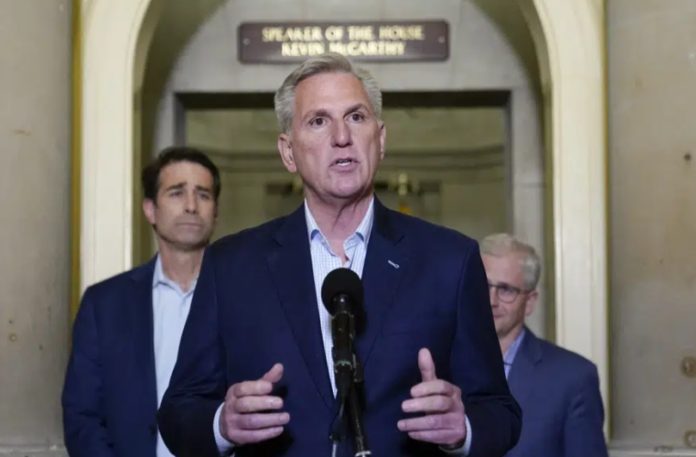
WASHINGTON (AP) — An “agreement in principle” between President Joe Biden and House Speaker Kevin McCarthy would raise the nation’s legal debt ceiling, but now Congress has only days to approve a package that includes spending cuts and would avert a potentially disastrous U.S. default.
The compromise announced late Saturday risks angering both Democratic and Republican lawmakers as they begin to unpack the concessions. Negotiators agreed to some Republican demands for increased work requirements for recipients of food stamps that House Democrats had called a non-starter. But bargainers stopped short of greater spending cuts overall that Republicans wanted.
Support from both parties will be needed to win congressional approval before a projected June 5 government default on U.S. debts. Lawmakers are not expected to return to work from the Memorial Day weekend before Tuesday, at the earliest, and McCarthy has promised lawmakers he will abide by the rule to post any bill for 72 hours before voting.
White House officials planned to brief House Democrats on a video call Sunday.
The Democratic president and Republican speaker reached the agreement after the two spoke Saturday evening by phone. The country and the world have been watching and waiting for a resolution to a political standoff that threatened the U.S. and global economies.
“The agreement represents a compromise, which means not everyone gets what they want,” Biden said in a statement. “That’s the responsibility of governing.”
Biden said the deal was “good news for the American people because it prevents what could have been a catastrophic default and would have led to an economic recession, retirement accounts devastated, and millions of jobs lost.”
McCarthy, in brief remarks at the Capitol, said that “we still have a lot of work to do.”
But he added: “I believe this is an agreement in principle that’s worthy of the American people.”
With the outlines of an agreement in place, the legislative package could be drafted and shared with lawmakers in time for House votes as soon as Wednesday, and later in the coming week in the Senate.
Central to the compromise is a two-year budget deal that would hold spending flat for 2024 and increase it by 1% for 2025 in exchange for raising the debt limit for two years, which would push the volatile political issue past the next presidential election.
Driving hard for a deal to impose tougher work requirements on government aid recipients, Republicans achieved some but not all of what they wanted. The agreement would raise the age for existing work requirements on able-bodied adults, from 49 to 54, without children. Biden was able to secure waivers for veterans and the homeless.




